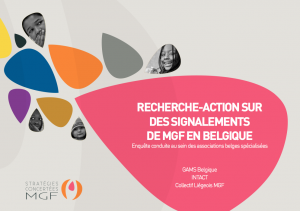 Female genital mutilation is a human rights violation and a violation of the right to health and the physical integrity of women and girls. On the occasion of Universal Children’s Day held on 20 November, the CS-FGM network in collaboration with the Observatoire du sida et des sexualités published the results of an action survey on the reporting of female genital mutilation in Belgium. A very broad survey was held with the organisations working in the field of FGM in Belgium: GAMS Belgique, INTACT and Collectif Liégeois de lutte contre les MGF. 52 cases were thus reviewed between 1 January 2009 and 30 June 2013. Most reportings concern 2012 and 2013. According to Concerted Strategies coordinator Marie De Brouwere, ‘it shows that the increased training for professionals since 2012 is starting to pay off and that professionals are now better at identifying risk situations, such as a holiday in the country of origin.’ Most interventions (41/52) were for children at risk of cutting: a planned trip to their country of origin or parents wanting to uphold the tradition after the birth of a girl. CHU St-Pierre hospital staff have been confronted several times with parents asking where excision is performed in Belgium. First-line professionals (hospital staff, ONE, health-promotion teams in schools) are the primary source for reportings, followed by relatives and close acquaintances, hence the importance of training for professionals and prevention work in the communities.
Female genital mutilation is a human rights violation and a violation of the right to health and the physical integrity of women and girls. On the occasion of Universal Children’s Day held on 20 November, the CS-FGM network in collaboration with the Observatoire du sida et des sexualités published the results of an action survey on the reporting of female genital mutilation in Belgium. A very broad survey was held with the organisations working in the field of FGM in Belgium: GAMS Belgique, INTACT and Collectif Liégeois de lutte contre les MGF. 52 cases were thus reviewed between 1 January 2009 and 30 June 2013. Most reportings concern 2012 and 2013. According to Concerted Strategies coordinator Marie De Brouwere, ‘it shows that the increased training for professionals since 2012 is starting to pay off and that professionals are now better at identifying risk situations, such as a holiday in the country of origin.’ Most interventions (41/52) were for children at risk of cutting: a planned trip to their country of origin or parents wanting to uphold the tradition after the birth of a girl. CHU St-Pierre hospital staff have been confronted several times with parents asking where excision is performed in Belgium. First-line professionals (hospital staff, ONE, health-promotion teams in schools) are the primary source for reportings, followed by relatives and close acquaintances, hence the importance of training for professionals and prevention work in the communities.
The inventory was supplemented with personal interviews with a select number of actors and seven cases were further analysed. The result of this is described in detail in the present publication. This action survey was the first of its kind in Belgium and to date has enabled many actors in reporting situations to provide a better response and offer improved support to families at risk.
Due to size, the file has been split up into different parts:
Click each part to download it.
- Chapters 1 to 5
- Chapter 6 – études de cas
- End & appendices
